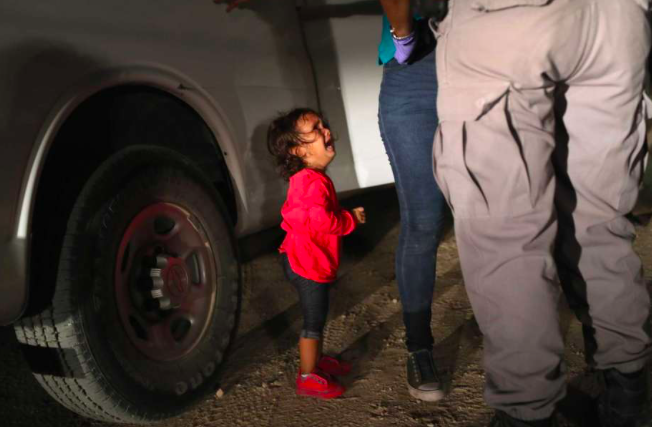
Whiteness has not been my witness. It has averted its eyes, its shards of denial making its way towards us, eyes shooting cursory glances, muted bullets. Wanda Coleman called it, “The War of the Eyes,” warning us that to “Be forewarned is to be forearmed.” It has turned a blind eye to the tax levied upon our skin.
Whiteness is denial, a false witness whose fruit is tainted as it falls to the ground, like the corpses of our ancestors. Whiteness is not a witness, but is party to, abets in the consent of the desecration of our bodies. Whiteness is a sheet conforming to the curvatures of coldness, the stillness of breath over the landscape of silence. Our thoughts, to some, should be white, our tongues should be white, our sweat should be white. The problem with this, of course, is that we, as people of color, cannot be white enough—never. We are in a constant struggle to outwit the white, as sure as the whites of our eyes.

I think of all that white sweat glistening on the tomatoes and strawberries in the fields. Of course, the soil is white, or should be, in any case. The indigenous bones have been dug up and tagged, absent of skin and white too. Indigenous children who have come hundreds, thousands of miles across the landscape only to be pulled from their parents—will be matched with a nice white family, whose color, of course, is under the skin. And, of course, there is a price to pay for this whiteness.
There was a popular, somewhat obnoxious song some years ago called Why Can’t I Be You? Perhaps the words can be bent to fit today’s decree: White, can I be you?
A great writer said that his country has never been white, and dared the country to prove it. What is the future of this nation when its past has been shown—written in blood, bone—tragedy and, at times, brilliance. It is, in the words of Orwell, “in front of your nose.”
The lynched bodies, the falsely accused, the testimony of those who were taken before their time all cry out to be heard. Where is hope when hope is drowned, when it comes up for air only to be submerged in the comfort of ignorance, which is a false comfort—mistaken for security—that leads to the death of body, spirit and mind. Who does one turn to? To whom does one make an appeal for life? Is there a 9-1-1 emergency line to call when the connections of communication to both past and present have been severed?
The answer will not be found in the White House—no surprise to us who consume minimal bites of truth from the spoon fed, tongue depressor apparatus known as the media. Does the declension have a remedy when our healers, our vessels of wisdom are shattered by means perfected through the ages? A nation intent on holding on to its hate, its legacy of hate at the cost of itself, of the sacred landscape upon which innumerable blessing flow; and the wall that that is supposed to cut off the flow, what are we to make of it?
If we remember one thing from the past is that one cannot escape it. Walls are rendered, in the end, to rubble, collapsing under the weight of truth, guided by the human spirit—through the centuries. And why build a wall—which, by the way, will likely be constructed by the labor of black and brown human beings—when there are walls abound. The skin tax borne by people is one wall–among many walls–of the institutional variety, fortified by media, and notions that cling like an incurable disease.
Help us save local journalism!
Every tax-deductible donation helps us grow to cover the issues that mean the most to our community. Become a 48 Hills Hero and support the only daily progressive news source in the Bay Area.
The separation of parents from their children is not new to America. What indignation was suffered to warrant such actions towards people who are the descendants of people who have lived in this land for centuries? What is the justification of incarcerating children then parading them, some as young as six years old, in a courtroom to defend themselves?
Decades ago, a writer wrote of the “White problem.” This problem has festered and is now imploding. Dear white people, brown people have been good to you. The pilgrims would have perished if not for the godliness of the native people who showed them how to plant corn—how to survive in a land that they could not conceive, in the deep structure of their humanity, the possibility of owning. In short, they would have dropped dead. The harvest that has enriched this country, and its white descendants, came by way of brown hands—hands that, along with black hands and white hands—have created unprecedented wealth in this country.
The brown children being held, incarcerated, snatched from their parent’s arms, are descendants of the original people of this land we call America (Writer Oscar Penaranda, among others, however, stresses that America refers to an entire hemisphere and that, as people living in the United States, should be referred to as US Americans or United Statesians).
It is with these children—and children like them—that our hope lies. To be true to this nation, this nation must look at itself and throw off the chains of white supremacy or superiority. Those children are our hope. Those young black men and women in the crosshairs of white supremacy are our hope—perhaps our only real hope. Our moment is here, it waits—it burns as the earth temperature rises. It is time for whiteness to truly look at itself and to be a worthy witness to the truth.

